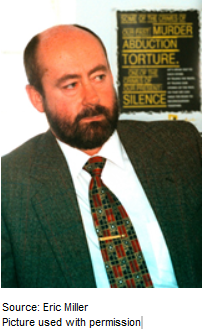
======================================================================================================================================================================================

On 18th December 2013, the Health Professions Council of South Africa found Dr Wouter Basson guilty of unprofessional conduct for acts committed whilst he was head of the Chemical and Biological Warfare programme of the South African Defence Force under apartheid. This came more than 13 years after a complaint against Dr Basson for unethical conduct was lodged with the HPCSA, and 16 years after he was first arrested on drug charges involving illegal possession of ecstasy tablets.
The basis for the decision of the committee related to four charges which were uncontested by Dr Basson. These included:
a) Dr Basson coordinated the production of large quantities of illegal psychoactive substances;
b) Dr Basson was involved in equipping mortars with teargas for use against Angolan government soldiers;
c) Dr Basson provided SADF operatives with disorienting substances to facilitate illegal kidnapping;
d) Dr Basson made available cyanide capsules to SADF soldiers so that they could decide to commit suicide to avoid revealing information under torture.
Dr Basson mounted nine arguments in his defence, each of which was carefully refuted in the judgement (see box for summary). The committee found that the conduct "was in breach of established ethical rules" and concluded that he was guilty of unprofessional conduct. Sentencing is due in June.
We wish to urge the HPCSA disciplinary committee to recognise the deep concerns of health professionals registered with the Council regarding this matter:
There have been many allegations made against Dr Basson, such as those contained in the Truth and Reconciliation Commission report, which have never had the opportunity to be tested in any court action. However, the evidence on which Dr Basson was convicted by the HPCSA disciplinary committee was evidence uncontested at his criminal trial, and which Dr Basson did not dispute at his disciplinary hearing. One of the basic principles of medical ethics is first do no harm. We therefore believe these acts alone constitute very serious breaches of medical ethics and it is unfathomable that a medical professional should consider it consistent with medical ethics to conduct him or herself in such a manner. They are not trivial matters that should be met with a token sanction.
Dr Basson has consistently denied any wrongdoing, in the lead-up to the hearing, during the proceedings and even after the findings of the committee. We find this deeply disturbing and indicate he is clearly out of touch with the ethical norms of his profession.
We disagree. There were many doctors who faced difficult moral choices at the same time as Dr Basson decided to take on leadership of the Chemical and Biological Warfare programme of the apartheid military, and many of these doctors paid dearly for their choices, some with their lives. For them, it is not possible to undo what has happened. Moreover, we know from the experience of other countries that have emerged from dictatorships that acknowledgement of past collusion in human rights violations and unethical conduct is essential to re-establishing trust in the medical profession. We owe that to our colleagues who took the moral choice, to our current students and to future generations of doctors to ensure that there is accountability for egregious violations of medical ethics no matter when they occurred so that a clear message is sent to prevent recurrence of such failings. It is also worth noting that the delay in finalising the charges against Dr Basson were due largely to his legal team and the choices he made to oppose various legal processes.
He is mistaken. His actions are deeply disturbing to a wide range of medical professionals who believe in maintaining the highest standards of ethical practice. This is evidenced by the 41 health professionals who lodged the initial complaints against Dr Basson in 2000 and by the many health professionals who have signed on to this submission.
The culture of impunity is a threat to our democracy. The culture of impunity involves, among other things, not knowing the truth about what happened in the past; avoiding bringing to justice those responsible for past violations; breaches of national and international laws; lack of transparency and patronage; weakness in the rule of law; a lack of trust in leaders, the judicial system and law enforcement; no redress for victims and as a consequence a re-victimization; no expectation of a healing process and failure to uphold ethical values. The Health Professions Council has an historic opportunity to take a firm stand against impunity and to strengthen democracy in South Africa.
In 1980, the then South African Medical and Dental Council failed to take appropriate action against the doctors who mistreated Steve Biko in detention allowing him to die as a result of torture at the hands of the security forces. This was a blot on the integrity of those who govern the medical profession. The SAMDC had to be forced to take disciplinary action against these doctors by a brave group of medical professionals who went to the Supreme Court for a court order. Part of their legal argument was that the then SAMDC had a responsibility to maintain the ethical standards of the profession.
Luckily, today, we live in a democracy and we do not have to go to court to get the HPCSA to take action. The HPCSA has taken action and it has delivered a very strong judgement on the matter of Dr Basson's unprofessional conduct. We hope that, unlike the old SAMDC, the HPCSA will, in its sentencing, be mindful of it responsibility to maintaining the standards of the profession.
We call on the Health Professions Council of South Africa to remove Dr Wouter Basson, head of the apartheid Chemical and Biological Warfare Programme, from the medical register in South Africa. This would be an appropriate sentence for egregious violations of medical ethics.
|